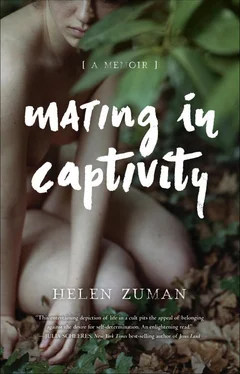Really, we were on a routine errand. A couple times a week, a pair of Zendiks made the short drive to Silver Creek and Highway 9 to meet the trucks that delivered most of our groceries. This time, since no other drivers had been available, I’d agreed to go with Amory. I welcomed the chance to spend a half hour alone with him in the middle of the day but worried we weren’t evolved enough to keep our vibes pure in square territory.
I glanced over my shoulder to check on our cargo, then turned to Amory, keen to funnel my tension into speakable form.
“You think you’ll be able to back the van up to the walk-in? With that big crew working on the brick path, you might not have enough room.”
Amory’s faint smile widened into a grin. “Relax! Don’t worry so much.” Taking the wheel with his left hand for a moment, he reached over to touch my wrist in reassurance.
“Did I ever tell you about how I used to drive trucks onto airplanes when I was in the army?”
“No.” All I knew about Amory’s five-year enlistment was that he’d spent time in Germany and that he’d purposely failed a drug test, by smoking pot, to get himself discharged. My own pre-Zendik past, once a lush wood I freely explored, now stood, gray with mist, behind a high, spiked, wrought-iron fence with no entrance. The only safe stories about life before the Farm were those showing the hero or heroine hitting dead ends in the Deathculture, then resurrecting at Zendik. All other plotlines led to psychic jungles sure to swallow me up. Still, I wanted to hear about Amory driving trucks.
“When my unit deployed to Saudi Arabia for Desert Storm, we had to pack trucks with equipment and drive them onto planes. There’s no extra space on a plane. Every square inch counts. And we had to make it so that when we landed we could drive right off. So I was backing these huge vehicles up a ramp into this tight space where I’d be screwed if I didn’t get it right.”
I imagined Amory at the wheel of a truck, eyes on his side mirror, easing the load behind him into just the right spot. He was the same Amory I knew (no crew cut, no uniform), but sexier than ever, as master of a few hundred horsepower.
“How’d you do? Did you always make it?”
“I might have nicked a mirror once or twice. But yeah, I always made it.”
“Wow,” I said, wishing we could escape to the date space right then.
He glanced at me and laughed. “So you can see why I’m not worried about backing the van up to the walk-in.”
I smiled back, pretending for a moment that we were a square couple on a road trip to the Smokies, with a cargo of coolers and camping gear. That we were free to care for each other in our moving cocoon—free to eat, sleep, detour as we pleased.
We turned from Lake Adger onto Regan Jackson. I dissolved my dream as we neared our driveway—sad to see it fade, afraid it would cost me.
Arol stopped a few feet from my seat on the Farmhouse porch and fixed me in her gaze, jabbing the air with a butter-colored folder.
“It’s all shit,” she said.
It was midmorning on a day in late May threatening highs in the nineties. Two weeks had passed since my van trip with Amory. The morning glories climbing the fence at Arol’s hip had already wilted in the heat. She slapped the folder against her thigh.
“Don’t ever sacrifice your art for a guy.”
Arol was interrupting the prep meeting for my first selling trip since Charleston. Knowing I couldn’t stay home forever, and fearing I’d lose my Warrior edge if I didn’t hone it in combat, I’d asked to join the all-girl crew set to sell the Chicago Blues Festival. Now I feared sabotage by my shadow: How could I keep myself from further acts of treason?
I’d already volunteered for more than my share of road prep, bearing in mind the “Affirmative Life” quote “Only in Giving is there Living.” I’d listened intently to the other sellers’ stories of previous Blues Fests, their tips for dodging security. I’d vowed to do whatever it took to subdue my darker forces before the van pulled out of the driveway the following morning.
“All shit”? What’s she talking about? Then I remembered: A week earlier, I’d given Arol a batch of writing from the past couple months. I’d been doing this intermittently for the past couple years.
Most of my pieces were short, since I wrote late at night or in snatches grabbed from communal life. Also, they were stunted: While penning sweeping laments for souls damned to the Deathculture and soaring paeans to an Ecolibrium future, I strung high-voltage wires around the shrunken range within which I was allowed to feel and ask. When doubt and rage prowled my fence line, jolts of self-reproach shocked them back.
Once, Arol had liked a batch of poems enough to stage a lunchtime reading. Twice, she’d published personal essays of mine—starring the Farm as savior—in the Zendik magazine. I’d hoped this latest sheaf of poems and stories would evince a breakthrough redeeming my two months at home. I’d even fantasized that Arol, awestruck, would draw me aside to say, “Helen, forget selling. You’re the Zendik scribe. That’s where your genius lies.”
Instead, she’d dismissed my work as “shit.”
“It’s got no heart,” she continued. “No guts. It’s like you’re spinning your wheels, off in la-la land. Why? Because you’re all wrapped up in what’s-his-name.” She snorted, eyes rolling skyward. “Once you’re in ‘love,’ you let everything else fly right out the window.”
I nodded, at once relieved that she’d voiced my worst fear and jarred by her scorn for my love affair. Surely she knew what I needed to do to keep it from wrecking my selling.
“Come up to the Addition after lunch,” she said. “We’ll go over what you wrote.”
That afternoon, across from Arol at her glossy kitchen table, in one of four matching chairs, I breathed in the beauty and calm of the best appointed and least chaotic room on the Farm. It did not ring with the din of a dozen conversations. It did not stink of sour milk, cat tiddle, buck musk. It did not collect towels, tools, jars, jackets, shoes. Not one forgotten object defiled its dark and gleaming counters, where clouds of royal blue and midnight, veined in black and silver, massed to form an imperial storm.
High on one wall, an epic collage juxtaposed photos of Arol, Wulf, Swan, and the Farm with illustrations from back issues of the Zendik magazine. The drawing that caught my eye showed the head of a mountain goat, divided into halves: one in solid ink, one in dotted outline. It was captioned “Tomorrow’s Ghost” and titled Extinction .
From my lap I pulled a half-filled page—a printout of a piece Arol hadn’t seen yet. I was hoping she would like it and hear the plea beneath the words for a spiritual cure. She signaled me to begin. Taut with anticipation, I read her the poem.
It began: “I feel DEAD. Just chalk in my throat and cover my eyes and dull out the days as dull they go by.” It ended: “PASSION, cold passion, hot ice on my heart, burning and freezing and breaking apart, I need a new heart.”
Arol nodded. “ That one’s emotionally honest. That’s how you really feel about your nowhere relationship.”
I flinched. She’d narrowed the question so quickly. Yes, the deadness I’d described had fed off my dread that the sheltering love I’d built with Amory would soon be condemned. Yes, I could twist this link to mean that loving him had dulled me. But wasn’t there more to the story? An additional thread or three? Hints at how lasting love, service to Zendik, and joyous work could interweave? A subtle pattern that Arol, with her genius for lifesaving, was uniquely suited to see?
Читать дальше











